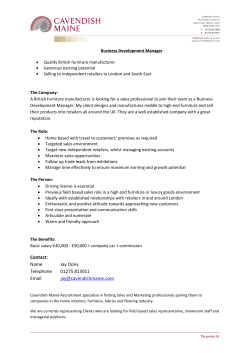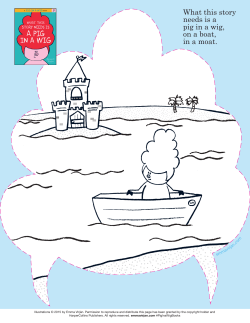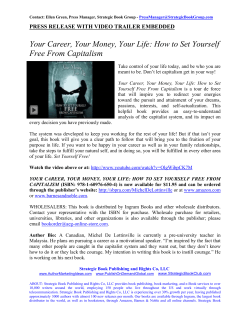
Google Launchpad case study: Tekstum
Being creative about product/ market fit BARCELONA 2015 Product UX/UI Marketing Tech Tekstum www.tekstum.com Industry Big data & sentiment analysis What is Tekstum? It a sentiment analysis tool for the publishing industry. Tekstum searches across all public reviews and social networks and creates intelligent product reviews that allows the publishing industry to better segment their market by understanding how readers feel. This knowledge can be used to produce more content for a specific segment, or to better target the potential market for the current catalog Founders Co-founded by Marc Santandreu Sellarés and Marc Martínez Canals Team Data scientist Alexandra Liguori, Web developer Juanjo Fernández and linguist Lauren Romeo Accelerator Big-Data accelerator Incubio. Tekstum was focused on validating their tool as a valuable product for the publishing industry. Ever since the day they starting working on the project, they had known that book publishers were going to be their target market. Their focus had been set on talking to them to create a product that would fit their needs and work hard to meet their expectations. Feedback from Google Launchpad mentors encouraged them to take a step back and be creative at finding a possible product/market fit that could give them extra potential for growth. First, by looking at the publishing industry as a whole, but by also adopting a horizontal approach and targeting various industries. CEO Marc Santandreu concluded: “The Launchpad experience has made us realize the true potential for scaling our business”. REPLACE PICTURE WITH PICTURE WITH SCREENSHOT OF THEIR PRODUCT What were they focusing on prior to Google Launchpad? Product / Market Fit Product/market fit means being in a good market with a product that can satisfy that market… you can always feel product/market fit when it's happening. The customers are buying the product just as fast as you can make it. Money from customers is piling up in your company checking account… Marc Andreessen:”THE PMARCA GUIDE TO STARTUPS “. THE PMARCA GUIDE TO STARTUPS - Marc Andreessen Tekstum founders had been focusing on creating the best possible product to service book publishers. They had been constantly talking to them and adding features to satisfy their needs. The feedback had been positive and publishers had shown growing interest in their services, which further reinforced their first intuition that publishers were their target market. What feedback did they receive from mentors? Google Launchpad is spread across 5 intense work days. Each day is focused on one specific topic, with experts in that area mentor the startups on one-on-one hour-long sessions. One day for product, one for UX/UI, one for marketing, and two full days for technology, to make up for the fact that it is technology that brings everything else together. Validated Learning Two main aspects were explored during Launchpad: • Book retailers may be a better product/market fit within the publishing industry. • Providing sentiment analysis for retailers as a value added service to their customers across al product categories. “Startups exist not to make stuff, make money, or serve customers. They exist to learn how to build a sustainable business. This learning can be validated scientifically, by running experiments that allow us to test each element of our vision.” Eric Ries The Lean Startup Principles Mentors converged from the very first moment on exploring other players in the publishing industry. Monica Carbonell suggested to offer the services to retailers such as Fnac and even small book shops in order to empower small businesses. Ismael Faro also suggested focusing on retailers by becoming the “TripAdvisor for books”, providing a ‘quality certificate’ for books so that customers had an easy reference while shopping. On a different note, Luz Lopez suggested putting more emphasis on creating value for the end user, the one who buys the book; and Pau Fernandez was even more ambitious by suggesting to forget about monetizing just yet, and focus on getting more end users and create value for them; value which Cecilia Tham articulated that could be done by making an app that would allow buyers to get a review on the go as they are shopping for books at a physical shop. There was however one piece of feedback that CEO Marc Santandreu acknowledged gave Tekstum a view of their full potential and scale. Cecilia Tham realized that Tekstum’s sentiment analysis tool was potentially much more powerful than Amazon’s current ‘‘stars’’ review system. Combining all comments into a single result could provide a ‘’big picture’’ view of any kind of product, not just books, to a consumer researching the market before a purchase. This would make e-shopping less intimidating by synthesising the overwhelming amount of information that is available to consumers. the big idea: >> Sentiment analysis could be scaled vertically in the publishing industry from publishers to retailers, and horizontally to cover all product categories. i. ii. Book publishers (Pearson, McGraw Hill, etc). Book distributors and retailers (Amazon, Fnac, etc). 2. Explore product/market fit and try to determine the market size and scalability of providing product sentiment analysis to retailers not only for books, but also for other content categories such as movies, but also to products such as smartphones, TVs, etc. How can I use this in my startup? What did they learn during Google Launchpad? 1. Retailers tend to operate at higher margins than publishers, thus targeting them may make finding paying customers potentially easier. 2. Sentiment analysis, when targeted to retailers, would be useful for not just books, but all kinds of product categories, thus opening a much larger potential market. >> Having a positive reaction from publishers as a potential customers so early in the startup process may have reduced the incentive to further explore other product/market fit. Validated learning about customers In order to build a scalable and profitable business model that can be scaled, thousands of decisions need to be made. Finding product /market fit is the result of conscious research and iteration process. Inspiration from The Lean Startup method, would provide an efficient way to evaluate, learn and implement new ideas and opportunities. What is their new focus and action plan following Google Launchpad? Although the company continues to maintain publishers as their main focus, Tekstum’s long-term roadmap has evolved significantly in the following ways: • Explore product/market fit across and beyond the publishing industry. • Validate learnings through rigorous analysis and iterate based on these learnings in order to focus on the right lines of business. Product / Market fit exploration Tekstum is in the process of developing a sentiment analysis tool. Its potential applications in the book publishing industry has gained its attention already. However, exploring a new market fit could bring about a bigger market to their plate. Tekstum’s new action plan: 1. Continue to explore the uses provided by their tool for for the publishing industry and try to determine the market size and possibility to scale while exploring two distinct potential targets: The principle of validated learning makes emphasis on getting hard data. For instance, by doing A/B tests, either on your website or even by showing and pitching different things to different potential customers, and then gathering their feedback. It is crucial to be critical and analytical about the aspects you are testing, and being honest about the implications of the results. Getting to customers hearts often implies your initial idea will not be executed exactly as you intended, but that is OK since it cannot be expected that you have all of the right answers since day one.
© Copyright 2025











